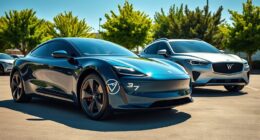When choosing between owning a car for equity or leasing for flexibility, consider what’s more important to you. Ownership means building value over time and having the freedom to use your vehicle as you wish, but it comes with higher upfront costs and maintenance responsibilities. Leasing offers lower monthly payments and easier upgrades, but you won’t own the car in the end. Exploring these options further can help you make the best decision for your needs.
Key Takeaways
- Ownership builds long-term equity and asset value, while leasing typically does not.
- Leasing offers greater flexibility to switch vehicles more frequently with lower monthly payments.
- Ownership involves higher upfront costs and maintenance expenses, whereas leasing often includes warranty coverage.
- Leasing has mileage limits and wear restrictions, reducing flexibility in vehicle usage.
- Choosing depends on prioritizing long-term asset building versus short-term affordability and flexibility.

When deciding how to allocate resources or design policies, it’s crucial to contemplate whether equity or flexibility should take priority. This choice becomes especially relevant when you’re weighing the benefits of owning a car versus leasing one. Owning a vehicle gives you the freedom to use it as you see fit, but it also comes with significant financial commitments, such as loan obligations and maintenance costs. On the other hand, leasing offers more flexibility but can sometimes feel less equitable, especially if you’re paying for a newer car that you don’t fully own. Understanding these factors can help you make a decision aligned with your financial situation and personal priorities.
If you opt to own a car, you’re taking on loan obligations that require a substantial upfront payment or monthly installments. These payments contribute to building equity in the vehicle, but they also tie up your financial resources. Maintenance costs are another critical consideration. As the owner, you’re responsible for routine servicing, repairs, and unexpected issues that crop up over time. While owning might seem more equitable in the long run because you’re building ownership, it often requires a larger initial investment and ongoing costs that can strain your budget if not planned carefully.
Leasing, in contrast, shifts many of these financial burdens. When you lease, your monthly payments tend to be lower, and maintenance costs are often covered under warranty or lease agreements. This arrangement provides greater flexibility—you’re not committed to owning the vehicle long-term, and you can switch cars more frequently without the hassle of selling or trading in. However, leasing can feel less equitable if you’re paying for a car that you will never truly own, and there are often mileage limits and wear-and-tear clauses that could lead to additional charges. It’s a trade-off: you get the benefits of lower upfront costs and fewer maintenance worries, but you don’t build equity in the vehicle.
Ultimately, your choice depends on how you value equity versus flexibility. If you’re comfortable with higher upfront costs and want to eventually own the vehicle outright, owning might suit you best. But if you prioritize lower monthly payments and want the ability to change cars more often, leasing could be more advantageous. Both options have their pros and cons related to loan obligations and maintenance costs, so weigh these factors carefully. Remember, your financial stability and lifestyle needs should guide your decision, ensuring you select an approach that aligns with your long-term goals.
Frequently Asked Questions
How Does Insurance Impact Leasing Versus Ownership Costs?
Insurance costs impact leasing and ownership differently because of policy differences. When leasing, you typically face higher insurance premiums since leases often require extensive coverage to protect the vehicle. Ownership may offer lower insurance costs over time, but you’re responsible for any damages or claims. Consider these policy differences when budgeting, as higher insurance costs on leases can add to your monthly expenses, whereas ownership might provide more flexibility in coverage choices.
What Are the Tax Implications of Leasing Compared to Buying?
When comparing leasing and buying, leasing often offers tax benefits because you can deduct lease payments as business expenses, depending on your usage. Buying allows you to take advantage of depreciation rules, which let you deduct a portion of the vehicle’s value over time. If you’re self-employed or use the car for work, these tax implications can substantially influence your decision, so it’s wise to consult a tax professional.
Can I Customize a Leased Vehicle Like I Can With Ownership?
You can’t customize a leased vehicle as freely as you can with ownership. Lease agreements typically restrict modifications, and any lease modifications usually require prior approval from the leasing company. If you want to personalize your car through customization options, owning is the better choice. With ownership, you have the freedom to make lease modifications and modifications without worrying about violating lease terms or losing your security deposit.
What Happens if I Exceed Mileage Limits on a Lease?
If you exceed the mileage limits on your lease, you’ll face mileage penalties, which usually involve paying additional fees per mile over the limit. These lease end fees can add up considerably, so it’s important to track your mileage. To avoid surprises, consider negotiating higher mileage limits upfront or plan your driving accordingly. Staying within the agreed mileage helps you avoid costly lease end fees and keeps your leasing experience smooth.
Are There Credit Score Requirements for Leasing or Purchasing?
When you’re looking to lease or buy, credit requirements play a key role in leasing qualifications and purchasing options. Typically, you need a good credit score—usually around 650 or higher—to qualify. Lenders and leasing companies review your credit history to make sure you can handle payments. If your credit is lower, you might face higher interest rates or need a co-signer. Improving your credit score can help you qualify more easily.
Conclusion
When choosing between owning and leasing, consider that 65% of drivers prefer ownership for long-term value, while 35% favor flexibility. If you value building equity and driving your car for years, buying might suit you better. But if you want lower monthly payments and the chance to switch models often, leasing offers freedom. Ultimately, your choice depends on whether you prioritize long-term investment or short-term flexibility—both options have their own advantages.









